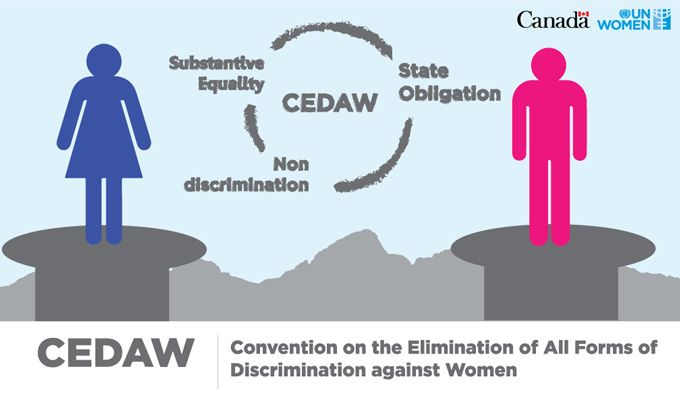Convention on the Elimination of all Forms of Discrimination Against Women (CEDAW)

Introduction
- The Convention on the Elimination of all Forms of Discrimination Against Women (CEDAW) is a United Nations treaty, adopted in 1979 and implemented on 3rd September 1981.
- It’s described as an international bill of rights for women, ratified by 189 states.
-
India ratified CEDAW on 9th July, 1993 committing a national agenda for the State Parties to end discrimination against women in India.
Structure of CEDAW
- CEDAW is divided into six parts and includes 30 articles:
Part I (Articles 1–6): Non-discrimination, Sex Stereotypes, and Sex Trafficking
- Article 1: Defines discrimination against women
- Articles 2-6: Mandate steps to eliminate discrimination and protect women’s rights
Part II (Articles 7–9): Women’s Rights in Public Sphere
- Emphasizes political life, representation, and rights to nationality
Part III (Articles 10–14): Economic and Social Rights of Women
- Focuses on education, employment, and health, with special protections for rural women
Part IV (Articles 15-16): Equality in Marriage and Family Life
- Stipulates equality before the law
Part V (Articles 17–22): Committee on Elimination of Discrimination Against Women
- Establishes the committee and states’ reporting procedure
Part VI (Articles 23–30): Effects of the Convention
- Covers effects on other treaties, states’ commitment, and convention administration
Articles 25–30: Administration of CEDAW
- Detail general administrative procedures regarding enforcement, ratification, and reservations
CEDAW, UNSCR 1325, and 1820
- CEDAW, UN Security Council Resolutions 1325 and 1820, intersect to enhance implementation and impact.
- Resolutions 1325 and 1820 clarify the scope of CEDAW in conflict situations.
- CEDAW provides strategic guidance on commitments outlined in these Resolutions.
- CEDAW is expected to be incorporated into national laws as the highest standard for women’s rights.
Members and Ratification
- Six UN member states have not ratified or acceded to the convention: Iran, Palau, Somalia, Sudan, Tonga, and the United States.
- The UN non-member state that has not acceded to the convention is the Holy See/Vatican City.
- The Republic of China (Taiwan) ratified the treaty in its legislature in 2007, but is unrecognized by the UN.
- South Sudan is the latest state to have acceded the convention, on 30th April 2015.
- Multiple unsuccessful ratification attempts in the United States. Over 40 cities and local governments have adopted CEDAW ordinances or resolutions.
- India ratified CEDAW on 9th July, 1993
Committee on the Elimination of Discrimination Against Women (CEDAW Committee)
- CEDAW Committee oversees the Convention and ensures adherence to the rules.
- The formation and functioning of this committee were outlined in Article 17 of the CEDAW.
- The committee has evolved over time due to an increased focus on women’s rights issues.

